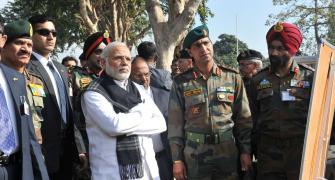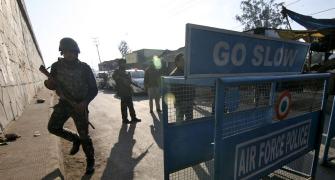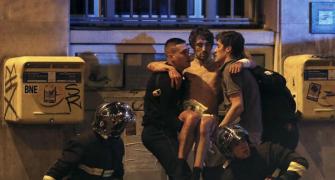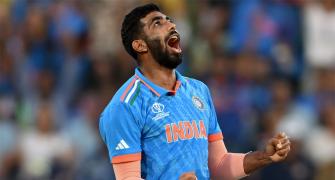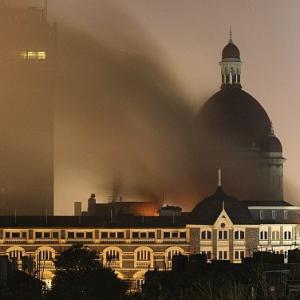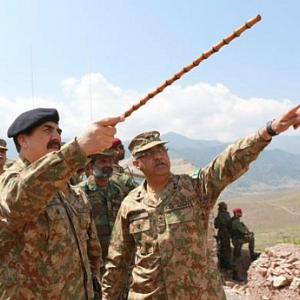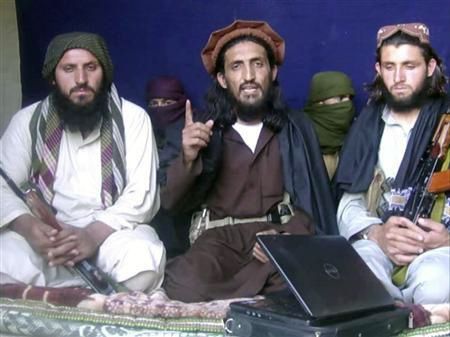 'Omar Khorsani has called repeatedly for the most barbaric of attacks. He is very adept on social media. He is, in other words, eerily similar to the ISIS leader Baghdadi.'
'Omar Khorsani has called repeatedly for the most barbaric of attacks. He is very adept on social media. He is, in other words, eerily similar to the ISIS leader Baghdadi.'
'The crux of the Pakistan army's 'strategic asset' policy -- its policy of regarding militants as those that can help Pakistan pursue its regional interests -- is that Pakistan needs help in weakening India or in keeping its presence minimal in the region.'
Michael Kugelman reveals what the world can expect from the Tehreek-e-Taliban Pakistan.
In an e-mail interview with Nikhil Lakshman/Rediff.com, Michael Kugelman, a scholar on South Asian affairs at the Washington, DC think-tank, the Woodrow Wilson Centre, discussed the aftermath of the horrific Peshawar massacre and if it will change the Pakistan army's mindset on nurturing jihad.
IMAGE: Terrorists owing allegiance to Omar Khorasani, centre, are said to be responsible for the December 16, 2014, Peshawar school massacre and the January 20, 2016 attack on the Bacha Khan University.
Photograph: Reuters
You had earlier pointed out the links between the Tehreek-e-Taliban Pakistan and the Islamic Movement of Uzbekistan. Uzbek terrorists are believed to have participated in the Karachi airport attack earlier this year as well as Tuesday's attack in Peshawar.
Could you please explain the nexus between these two terror groups? How did such a connection come into being?
Why would the Uzbeks get involved in a battle that is not theirs?
It's unclear how these two groups became such close partners, but I suspect the common link -- and the explanation for their partnership -- is Al Qaeda. Both the IMU and TTP have had long and deep relationships with Al Qaeda, and I imagine that Al Qaeda has seen these two groups as advantageous allies in that they can help pursue Al Qaeda's interests in Pakistan (which basically means killing people) even as Al Qaeda's capacities in the region have eroded significantly in recent years.
The IMU is an extremely vicious organisation fully invested in the idea of imposing hardline Islamist political structures -- whether in Uzbekistan or elsewhere, including Pakistan. It's also worth noting that the IMU has been very active in parts of Afghanistan, far away from Kabul.
This is another example of the IMU's desire to fight outside of its own country. For the IMU, any jihadist battle is seen as theirs -- even if it doesn't take place in Uzbekistan.
The TTP has become -- if that is possible -- a more brutally murderous group than what it was in the last years of the previous decade. Then, its methods broadly mirrored the Pakistani provinces in which it was spawned.
In recent years its methods have resembled what ISIS does currently -- beheading of troops, mass massacres like what we saw in Peshawar on Tuesday and the attack on the choir group in September.
How do you account for this terrifying change? Could it be the influx of Arab and Uzbek terrorists in its ranks?
Could it be that the TTP, pushed to the wall by the Pakistani military offensive, has decided to retaliate against soft targets and escalate the war in the northern provinces?
It's unclear what has been driving the TTP's changing tactics. I think there is something to be said for the idea that as the Pakistani military has cracked down on the TTP, and the group's operational capacities have been degraded, that the Taliban has been forced to focus on softer targets that are easier to get at and inflict damage on.
Another factor driving this story is the infighting within the Taliban -- it has spawned breakaway factions and splinter groups that take a much harder line (if that's possible) than the parent Taliban itself.
Consider that the Jamaat ul-Ahrar, the TTP splinter group from the Mohmand tribal agency, was formed to mark its displeasure with the TTP's willingness to explore peace talks with the government.
This group, headed by sadistic commanders like Omar Khorasani, is truly psychopathic. Its attacks have been particularly brutal.
What do you know about Omar Khorsani whose breakaway faction of the TTP is said to be behind the attacks in Karachi and Peshawar? How large is his group, and where does it derive its support from?
When he was still with the Taliban proper I described him as the Taliban's most dangerous commander, and now that he has broken away I'd describe him as perhaps the most dangerous militant in Pakistan.
He has always opposed the idea of peace with the government, and he has called repeatedly for the most barbaric of attacks. He is also very adept on social media (and loves to showcase his brutalities on Twitter).
He is, in other words, eerily similar to the ISIS leader Baghdadi. It's unclear how large his group is -- he had headed the Mohmand branch of the TTP, which had a sizable contingent. However, when he formed Jamat ul-Ahrar, he drew the support of various influential Taliban commanders from other TTP factions as well.
He essentially represents the worst of the worst when it comes to the Taliban, which in itself represents the worst of the worst when it comes to militants in Pakistan.
The Pakistani military claims great success against the TTP in its current offensive. Would you know if this success is real, or imaginary?
After all, just a few years ago, the military had claimed to have nearly wiped out the Pakistani Taliban, citing huge casualties. Yet the bodies were never seen, and the TTP grew stronger than before.
Does the TTP's current ascent owe to the absence of a military strategy during the Zardari years? Why did the Pakistan army go slow on the TTP?
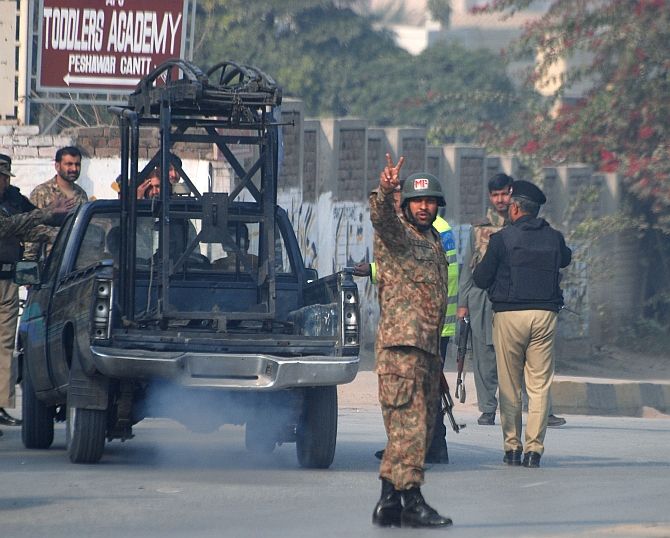
Since the military is so opaque about its operation in Waziristan, it's hard to know what's really going on. I do think that the offensive has killed a bunch of fighters, but this is not necessarily a huge mark of success.
There are strong indications that many TTP fighters were simply displaced by the operation, and moved into other tribal areas or slipped into Afghanistan, where top TTP commanders -- including its supreme leader -- are already based.
Image: Pakistani troops during the operation in Peshawar on December 16, 2014.
Photograph: Reuters
I do think the TTP has been weakened -- thanks in great part to drones and to military offensives. And the (Pakistan)army has actually not gone slow on the TTP -- it has been fighting it for years, even as the government has entertained the idea of negotiations, an idea that I believe the army has always abhorred.
However, the Taliban remains strong because it is resilient, it attracts new recruits angered by drone strikes and Pakistani military operations, and has vicious militant allies to turn to.
Does the TTP have patrons in the Pakistan army, like say the Lashkar-e-Tayiba has? If that is so, why did this happen?
Was it because the generals wanted to utilise the TTP as an option in Afghanistan after the Americans withdrew? Did they not understand the damage the TTP was inflicting on Pakistan?
How do you account for the powerful Pakistan army's ineffectiveness in quelling the TTP?
The army's relationship with the TTP is much different than it is with its relationship with what the security establishment sees as 'good' militants -- the Afghan Taliban, the Haqqani Network, or LeT. In other words, groups that don't target the Pakistani State.
In my view, the army generally sees the TTP as a group that needs to be wiped off the face of the earth -- after all, for years it has killed scores of soldiers.
However, I do think that elements of the security establishment keep an open mind about the TTP and are willing to look sympathetically at those TTP fighters and leaders willing to lay down their guns, or, more likely, turn their guns away from Pakistan and toward Afghanistan (or, hypothetically, India).
In other words, if the Pakistani security establishment identifies possible 'assets' within the TTP, then it will certainly be willing to cultivate a relationship with these types of TTP members.
But on the whole, the army wants to destroy the TTP. If only it wanted to do the same with other militant groups in Pakistan.
Will the Peshawar massacre change the mindset about terrorism in Pakistan? Or will it be business as usual soon?
Will there be a new State policy towards jihad? Or are we being naive in assuming that the Pakistan army will come down on all jihadis, even those they patronised over the years?
How do you see the impact of the Peshawar massacre?
Unfortunately I'm not holding my breath for any sort of change in mindset or paradigm shift. If anything, this attack will only solidify the military's view that the anti-State militants like the TTP and its allies such as IMU are the most direct threat that the Pakistani State faces, and that they are the ones that need to be rooted out -- and not those groups like the Afghan Taliban that basically leave the Pakistani State alone.
Quite frankly, so long as there is not peace with India -- and let's face it, that's not happening anytime soon -- I don't see the military changing its position.
The crux of its 'strategic asset' policy -- its policy of regarding some militants as those that can help Pakistan pursue its regional interests -- is that Pakistan needs help in weakening India or in keeping its presence minimal in the region.
Its sponsorship of the Afghan Taliban allows it to support a group that wreaks havoc in Afghanistan and seeks to minimise India's presence there.
Its sponsorship of LeT and the JeM (Jaish-e-Mohammad) allows it to support groups that want to go after India.
The Peshawar attack won't change this calculus at all, unfortunately.
If there's one silver lining, it's that the attack will galvanise the Pakistani public and cause it to apply more pressure on the Pakistani government and military to deepen the fight against militancy.
Not that this demand will be heeded, but public opinion is important. Let's remember that the Pakistani military launched its offensive in Swat only after Pakistani public opinion turned in strong favour of such an intervention.
To a lesser extent, the same was true about the decision to launch the offensive in North Waziristan.

